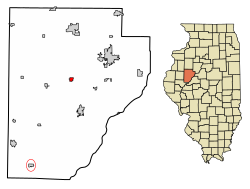Cuba, Illinois
Cuba, Illinois
Centerville Middletown | |
|---|---|
| Nicknames: Cube, Cubie-town | |
 Location of Cuba in Fulton County, Illinois. | |
| Coordinates: 40°29′37″N 90°11′36″W / 40.49361°N 90.19333°W[1] | |
| Country | United States |
| State | Illinois |
| County | Fulton |
| Township | Putman |
| Founded | 1818 |
| Area | |
• Total | 0.54 sq mi (1.41 km2) |
| • Land | 0.54 sq mi (1.41 km2) |
| • Water | 0.00 sq mi (0.00 km2) |
| Elevation | 682 ft (208 m) |
| Population (2020) | |
• Total | 1,184 |
| • Density | 2,180.48/sq mi (841.60/km2) |
| Time zone | UTC-6 (CST) |
| • Summer (DST) | UTC-5 (CDT) |
| Postal code | 61427 |
| Area code | 309 |
| FIPS code | 17-17991 |
| GNIS ID | 2393689[1] |
Cuba is a city in Fulton County, Illinois, United States. The population was 1,184 at the 2020 census.[3]
History
[edit]
Cuba was founded in 1837 when the two rival towns of Centerville and Middleton merged.[4] The new town was named after the island of Cuba.[5] A post office has been in operation at Cuba since 1837.[6]
Geography
[edit]Cuba is located near the geographic center of Fulton County. Illinois Route 97 passes through the city, leading north 40 miles (64 km) to Galesburg and south 20 miles (32 km) to Havana on the Illinois River.
According to the 2021 census gazetteer files, Cuba has a total area of 0.54 square miles (1.40 km2), all land.[7]
Demographics
[edit]| Census | Pop. | Note | %± |
|---|---|---|---|
| 1860 | 348 | — | |
| 1870 | 568 | 63.2% | |
| 1880 | 656 | 15.5% | |
| 1890 | 1,114 | 69.8% | |
| 1900 | 1,198 | 7.5% | |
| 1910 | 2,019 | 68.5% | |
| 1920 | 1,484 | −26.5% | |
| 1930 | 1,479 | −0.3% | |
| 1940 | 1,620 | 9.5% | |
| 1950 | 1,482 | −8.5% | |
| 1960 | 1,380 | −6.9% | |
| 1970 | 1,581 | 14.6% | |
| 1980 | 1,648 | 4.2% | |
| 1990 | 1,440 | −12.6% | |
| 2000 | 1,418 | −1.5% | |
| 2010 | 1,294 | −8.7% | |
| 2020 | 1,184 | −8.5% | |
| U.S. Decennial Census[8] | |||
As of the 2020 census[3] there were 1,184 people, 457 households, and 227 families residing in the city. The population density was 2,180.48 inhabitants per square mile (841.89/km2). There were 540 housing units at an average density of 994.48 per square mile (383.97/km2). The racial makeup of the city was 95.95% White, 0.25% African American, 0.08% Native American, 0.08% Asian, 0.00% Pacific Islander, 0.08% from other races, and 3.55% from two or more races. Hispanic or Latino of any race were 1.10% of the population.
There were 457 households, out of which 21.9% had children under the age of 18 living with them, 34.57% were married couples living together, 11.82% had a female householder with no husband present, and 50.33% were non-families. 43.11% of all households were made up of individuals, and 13.79% had someone living alone who was 65 years of age or older. The average household size was 3.11 and the average family size was 2.22.
The city's age distribution consisted of 19.4% under the age of 18, 8.6% from 18 to 24, 15.1% from 25 to 44, 34.6% from 45 to 64, and 22.3% who were 65 years of age or older. The median age was 48.3 years. For every 100 females, there were 111.9 males. For every 100 females age 18 and over, there were 99.8 males.
The median income for a household in the city was $33,672, and the median income for a family was $60,313. Males had a median income of $34,375 versus $30,227 for females. The per capita income for the city was $25,716. About 11.9% of families and 18.0% of the population were below the poverty line, including 34.3% of those under age 18 and 5.3% of those age 65 or over.
Notable people
[edit]- Paul H. Landis, sociologist born in Cuba in 1901[9]
- Harry K. Newburn, educator born in Cuba[10]
References
[edit]- ^ a b c U.S. Geological Survey Geographic Names Information System: Cuba, Illinois
- ^ "2020 U.S. Gazetteer Files". United States Census Bureau. Retrieved March 15, 2022.
- ^ a b "Explore Census Data". data.census.gov. Retrieved June 28, 2022.
- ^ Callary, Edward (September 29, 2008). Place Names of Illinois. University of Illinois Press. p. 84. ISBN 978-0-252-09070-7.
- ^ Gannett, Henry (1905). The Origin of Certain Place Names in the United States. Government Printing Office. p. 96.
- ^ "Fulton County". Jim Forte Postal History. Retrieved November 2, 2015.
- ^ "Gazetteer Files". Census.gov. United States Census Bureau. Retrieved June 29, 2022.
- ^ "Census of Population and Housing". Census.gov. Retrieved June 4, 2015.
- ^ D'Antonio, William V., ed. (November 1985). "Obituaries" (PDF). Footnotes. 13 (8). Washington, D.C.: American Sociological Association: 15. ISSN 0749-6931.
- ^ "Office of the President: Harry K. Newburn and Orlando John Hollis (interim) records". archiveswest.orbiscascade.org. Retrieved April 4, 2024.



